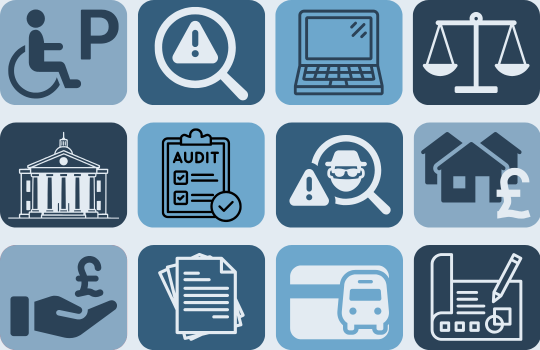Fraud in public services erodes trust, wastes scarce resources and undermines the delivery of essential outcomes. Yet despite stronger systems and awareness, new risks keep emerging. From procurement and grants to cyber and payroll fraud and beyond, fraud keeps evolving. How can Scotland’s public sector move beyond strategy and compliance to embed prevention and detection in every part of its operations?
Fraud in Scotland’s public services is not a distant or hypothetical problem – it is here, now and growing. In 2022–23, the National Fraud Initiative uncovered £21.5 million in fraud and error across Scottish public bodies – a near 50 percent rise on previous years. In 2023, the courts heard of a £6 million NHS contract bribery and procurement fraud scheme, exposing deep weaknesses in governance and oversight. From local authority grants to social housing and benefit payments, the risks are increasing and becoming more complex.
Scotland’s public sector is committed to high standards of integrity and stewardship. However, competing pressures – stretched budgets, workforce gaps, and rapid digital change – can leave organisations vulnerable to exploitation. As cases grow in sophistication, traditional controls are no longer enough. Fraudsters innovate, adapt and collaborate – Scotland’s public sector must therefore do the same. What risks are you and your organisation exposed to by the evolving threats?
The challenge now is to turn awareness into concrete prevention. How should public bodies act before losses occur? How can they use data proactively? What organisational culture can foster detection and deterrence as daily habits rather than annual audits? Learning from proven successes is possible – systems and innovations that have already worked in preventing or reducing fraud elsewhere.
This online conference will focus on three themes:
Benefits of attending
Who should attend

Director of Strategic Procurement
Scotland Excel

Deputy Head of Counter Fraud Services
NHS Scotland Counter Fraud

Head of Financial Crime Solutions
Sopra Steria
09:25 Chair's opening remarks
Hugh Carr, Director of Strategic Procurement, Scotland Excel
ScotlandExcel
Session 1: Understanding the landscape – risks, responsibilities and systemic challenges
09:30 Keynote speaker – The scale of the threat: understanding the true picture of public sector fraud in Scotland
09:45 Question and answer session
09:55 Embedding a culture of prevention: governance, accountability and leadership
Scott Fraser, Deputy Head of Counter Fraud Services, NHS Scotland Counter Fraud
NHSSCFS
10:10 Data-driven detection: using analytics and technology to identify and reduce fraud
Chris Oakley, Head of Financial Crime Solutions, Sopra Steria
Linkedin
10:25 Question and answer session
10:40 Comfort break
Session 2: Practical action – prevention, detection and response in practice
10:55 Procurement and commissioning: closing the gaps where fraud thrives
11:10 Grants, benefits and local payments: designing controls that prevent misuse
11:25 The role of whistleblowing and internal reporting in fraud prevention
11:40 Question and answer session
11:55 Comfort break
Session 3: Moving from intention to action – building systems that deliver
12:10 Continuous monitoring and exception reporting in real time
12:25 Innovation and future trends: using new tools and technologies to stay ahead
12:40 Post-award contract and supplier auditing and verification
12:55 Question and answer session
13:10 Chair's closing remarks
Hugh Carr, Director of Strategic Procurement, Scotland Excel
ScotlandExcel

Hugh Carr
Director of Strategic Procurement
Scotland Excel
Hugh provides leadership to Scotland Excel's strategic procurement teams and ensures that the organisation delivers best value collaborative contracts to its customers. Hugh works closely with stakeholders to ensure that their strategic priorities are incorporated into future development plans, and that the needs of our sector are represented in national procurement plans.
Hugh has extensive experience of supply chain and outsourcing management. He spent 12 years at the electronics company Compaq, and has held senior roles at Accenture, Network Rail and Babcock International. Prior to joining Scotland Excel, Hugh was responsible for supply chain and commercial management at Scottish Water Solutions.
Scotland Excel has said “This event is a vital opportunity to strengthen our collective response to fraud in Scotland’s public sector. As the National Centre of Procurement Expertise for Local Government, Scotland Excel is committed to ensuring that public procurement is resilient against fraudulent practices.
Serious organised crime and anti-competitive behaviour pose real risks to public sector supply chains. By working together to recognise warning signs, strengthen controls, and apply robust procurement strategies, we can protect public funds and maintain trust in the systems that deliver vital services to our communities.”

Scott Fraser
Deputy Head of Counter Fraud Services
NHS Scotland Counter Fraud
With over 20 years’ service in National Services Scotland, Scott is currently operating as deputy head of Counter Fraud Services and National Counter Fraud Manager responsible for the fraud detection function.
Prior to NHS Scotland he managed a portfolio of counter fraud and audit work in NHS England, working for both public and private sector providers. His law enforcement training and experience was established during 16 years’ service with the Royal Air Force Police Special Investigation Branch.

Chris Oakley
Head of Financial Crime Solutions
Sopra Steria
Chris Oakley leads Sopra Steria’s Financial Crime Solutions practice, helping clients tackle evolving threats in fraud and financial crime. With over 20 years of experience across banking, fintech and regtech, he has held senior roles at Form3, Featurespace, HSBC & Virgin Money, delivering AI-driven risk platforms and real-time fraud prevention strategies.
At Sopra Steria, Chris is responsible for aligning innovative solutions like the Optimised Decision Engine (ODE) with market needs around explainable AI, scam prevention, and operational resilience. He is a regular industry speaker and an advocate for responsible technology in financial crime risk management.
This conference takes place online.
How to book
You can book to attend in 3 ways:
Conference fees
Please note – It is not permissible to share the recording. Please contact us if you wish to share it. See our terms and conditions for further information.
Payment
We do not currently accept payments online and will send you an invoice.
You have the option to pay by bank transfer or card.
Bank details will be included on the invoice.
If you wish to pay by card, please tick the appropriate box on the booking form and a member of our staff will contact you by telephone to take the payment. Alternatively you may call 0131 556 1500.
Terms and conditions
By placing this booking, you agree to the full terms and conditions found via the link at the foot of our website.
Book delegate places or purchase video recording.

